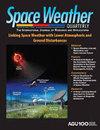Three‐Dimensional Modeling of the Ground Electric Field in Fennoscandia During the Halloween Geomagnetic Storm
IF 3.8
2区 地球科学
Q2 ASTRONOMY & ASTROPHYSICS
Space Weather-The International Journal of Research and Applications
Pub Date : 2023-09-01
DOI:10.1029/2022sw003370
引用次数: 1
Abstract
Abstract In this study, we perform three‐dimensional (3‐D) ground electric field (GEF) modeling in Fennoscandia for three days of the Halloween geomagnetic storm (29–31 October 2003) using magnetic field data from the International Monitor for Auroral Geomagnetic Effects (IMAGE) magnetometer network and a 3‐D conductivity model of the region. To explore the influence of the inducing source model on 3‐D GEF simulations, we consider three different approaches to source approximation. Within the first two approaches, the source varies laterally, whereas in the third method, the GEF is calculated by implementing the time‐domain realization of the magnetotelluric intersite impedance method. We then compare GEF‐based geomagnetically induced current (GIC) with observations at the Mäntsälä natural gas pipeline recording point. We conclude that a high correlation between modeled and recorded GIC is observed for all considered approaches. The highest correlation is achieved when performing a 3‐D GEF simulation using a “conductivity‐based” laterally nonuniform inducing source. Our results also highlight the strong dependence of the GEF on the earth's conductivity distribution.万圣节地磁风暴期间芬诺斯坎迪亚地电场的三维模拟
在本研究中,我们利用国际极光地磁效应监测(IMAGE)磁力计网络的磁场数据和该地区的三维电导率模型,在Fennoscandia进行了万圣节地磁风暴(2003年10月29日至31日)三天的三维地电场(GEF)建模。为了探讨诱导源模型对三维GEF模拟的影响,我们考虑了三种不同的源近似方法。在前两种方法中,源是横向变化的,而在第三种方法中,GEF是通过实现大地电磁场间阻抗法的时域实现来计算的。然后,我们将基于GEF的地磁感应电流(GIC)与Mäntsälä天然气管道记录点的观测结果进行比较。我们得出结论,在所有考虑的方法中,模型和记录的GIC之间存在高度相关性。当使用“基于电导率”的横向非均匀诱导源进行三维GEF模拟时,实现了最高的相关性。我们的结果也强调了GEF对地球电导率分布的强烈依赖。
本文章由计算机程序翻译,如有差异,请以英文原文为准。
求助全文
约1分钟内获得全文
求助全文
来源期刊
CiteScore
5.90
自引率
29.70%
发文量
166
审稿时长
>12 weeks
期刊介绍:
Space Weather: The International Journal of Research and Applications (SWE) is devoted to understanding and forecasting space weather. The scope of understanding and forecasting includes: origins, propagation and interactions of solar-produced processes within geospace; interactions in Earth’s space-atmosphere interface region produced by disturbances from above and below; influences of cosmic rays on humans, hardware, and signals; and comparisons of these types of interactions and influences with the atmospheres of neighboring planets and Earth’s moon. Manuscripts should emphasize impacts on technical systems including telecommunications, transportation, electric power, satellite navigation, avionics/spacecraft design and operations, human spaceflight, and other systems. Manuscripts that describe models or space environment climatology should clearly state how the results can be applied.

 求助内容:
求助内容: 应助结果提醒方式:
应助结果提醒方式:


